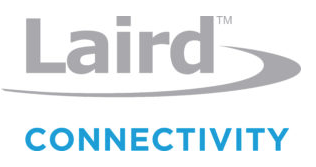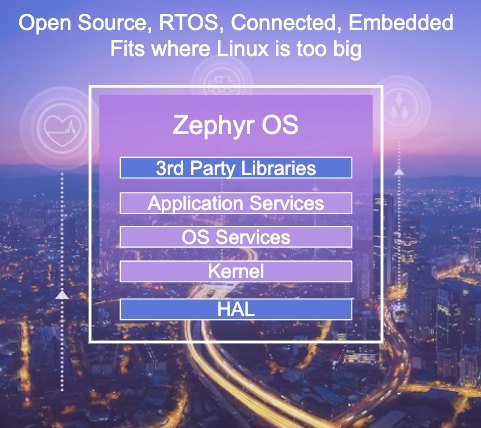Written by Jonathan Kaye, Senior Director, Product Management, Laird Connectivity
This post originally ran on the Laird Connectivity website. For more content like this, visit https://www.lairdconnect.com/resources/blog.
Joining for a Secure, Open Source, Stable IoT

One of the many advantages of working with Laird Connectivity is our commitment to design flexibility and scalable options for our customers. In our embedded microprocessor products, we strive to invest in your projects by helping you design your way. Developing with AT commands, our custom smartBASIC application environment, chipset provider SDKs, multiple RTOS support and more are just some of the supported options that give you design flexibility in building your applications.
Today we’re taking the next step forward by broadly supporting the Zephyr Project across our line of embedded microcontroller products. The Zephyr Project represents the largest open-source, open-governance RTOS with an emphasis on broad chipset support, security at the core, long term support, and widely-reusable code and functionality. The Zephyr Project’s key members include Intel, Nordic, NXP, Oticon, and many more.

The advantages are numerous, both for Laird Connectivity and for our customers in terms of community support, better device security, high performance in resource-light environments, and license-free use for commercial applications.
Laird Connectivity already supports Zephyr for our BL654 and BL652 modules in the Zephyr project, with the BL653 series to be added this month. Laird’s support of the Zephyr ecosystem will be bolstered further later in this month with the public availability of our Pinnacle™ 100 LTE M / NB-IoT / Bluetooth 5 modem family with complete Hostless mode support developed in Zephyr.
In addition to Zephyr support in the above embedded module developments, Zephyr support, documentation and sample applications are being rolled into our IoT Devices offerings with coming support for the BT510 IP67 Multi Sensor platform, BT710 Tracker / Multi Sensor and Sentrius™ MG100 LTE M / NB-IoT / Bluetooth Micro Gateway in the next quarter.

What is Zephyr RTOS?
Developers have lots of options when it comes to selecting a Real Time Operating System (RTOS) for embedded microcontrollers. But the Zephyr Project is one of the fastest growing open-source and broadly contributed RTOS project of its kind in the world.
Joining the Linux Foundation in 2016, the Zephyr Project mission is to provide a broadly-compatible, customizable, secure, and well-supported operating system for the lightweight devices that make up the internet of things (IoT). It’s made to contain everything developers need to provide a full application for the IoT, including a file system, wireless stacks, drivers, security features and – critically for Laird Connectivity and our industrial / medical customer base – LTS (Long Term Support) firmware.
Zephyr’s development is a joint partnership of more than a dozen companies and hundreds of contributors from the open source community. That in turn has contributed to a widespread compatibility with a huge variety of chipsets including ARM Cortex-M, Intel x86, ARC, NIOS II, Tensilica Xtensa and RISC-V 32, among many others.

The goal of the Zephyr Project is being realized every day, as an ever-growing list of small-footprint IoT devices gain access to an extensive kernel, multiple scheduling algorithms, cross-architecture compatibility, and built-in support for IoT protocols like Bluetooth 5. It’s built with security in mind as well, allowing for execution protection that protects memory, stack, and threads from malicious code, as well as root of trust support, secure boot, and device authentication.
Zephyr as an Ecosystem: Making Code More Reusable
Even setting aside Zephyr’s specific strengths as an RTOS and the features it lends to IoT developers, building with Zephyr means establishing a widely reusable base for your applications. For module manufacturers and OEMs alike, this means efficiency and portability. Develop for one architecture and then port to other supported devices. Modify and adjust that application so that it fits the destination platform with a highly customizable kernel and feature set.
By supporting Zephyr support across all our microcontroller-based products, Laird Connectivity is better positioned than ever to accelerate our support to OEMs across multiple product lines with ease. Bug fixes, security updates, and other development can be deployed across more devices thanks to the cross-platform support inherent in Zephyr. Each of our offerings gains the full weight of all our development efforts in Zephyr, which means fixes and features that are in your hands faster than ever.
In the IoT space, this kind of accelerated development and reusability is particularly advantageous. The IoT, perhaps more than any other space, thrives on the iterative growth of more and more devices, working with each other to enable, sense and control. Most IoT designs open the door for even more supplementary products that help perform a shared service. What might start as a gateway and a sensor can quickly balloon into a full ecosystem of sensors, wearables, lights, locks, cameras, push-buttons and more. Developing with a shared platform like Zephyr means every new addition to your IoT portfolio can leverage all your existing design work, with one shared code base.
Laird Connectivity: A True Design Partner
As with all of our supported development options, Laird Connectivity’s investment of time and software development makes it easier than ever to bring your wireless products to life. Our dedicated support and field application engineering teams are available to help you identify your product’s needs and scope, and help you get your device to market – on time and within budget.
Our design experts have decades of experience in product design, and have the experience to help you create reliable, high-quality products that perform to spec and satisfy your customers’ demands. And we can illuminate every step of the way – from material design to application development, regulatory certification and more.
Our line of wireless modules features the latest hardware from leading chipset manufacturers, ready to serve today’s emerging wireless applications. Our BL653 is the latest in IoT-ready Bluetooth 5.1 with 802.15.4 and NFC, designed specifically to power your IoT products. Based on the Nordic nRF52833, it provides high-power Bluetooth 5 connectivity and an ARM Cortex M4F MCU, all on a board designed for low power implementations for long term deployments on battery.
If you are interested in contributing to the Zephyr Project, check out the Contributor Guide. Join the conversation or ask questions via the Zephyr Mailing List.